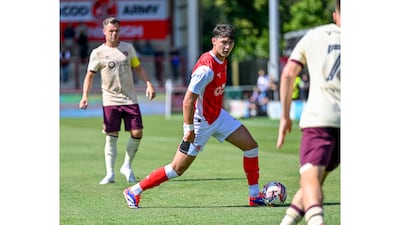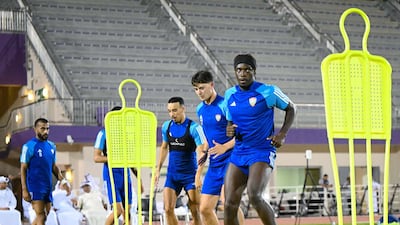Lumping the entire burden of expectation on a 22-year-old newcomer whose professional career so far amounts to less than a handful of games in English football’s fourth tier is a little harsh.
Mackenzie Hunt only met his new teammates in the national team of the UAE this weekend. Expecting him to come from Fleetwood Town to Abu Dhabi, train for a day or two at the New York University on Saadiyat Island, converse in a language he might have long forgotten since studying at school, and make the first XI for a World Cup qualifier is a bit of a reach.
And someone who sat on the bench 20 times in the Premier League last season without getting to play knows well not to take debuts for granted.
But let’s not understate this. Hunt’s presence in the 28-player UAE squad to face Qatar in Doha on Thursday night has the potential to be transformative for football in this country.
Could this be the moment when the national team finally has genuine cut through to the country’s western expatriate population?
When little boys and girls growing up aspiring to play international football will envisage themselves in the shirt of the country they live in, rather than the ones they are supposedly from?
In Hunt, they will see somebody who started out on the same fields as them, in the same educational system as them, who has now reached the international game.
Finally, the national team could get some overdue attention, and hopefully a little love, too, from the silent contingent beyond its regular audience.
The irony here is that Hunt was born in Liverpool, and does not actually live in the UAE. He hasn't since his rich potential in football led him – with a heavy heart – to depart Dubai in his early teens to join the academy of Premier League club Everton.
But his formative years were spent here. His ability with a football was honed as a young child on the sports field at Dubai English Speaking School, as well as under the expert supervision of the coaches at Go Pro Academy.

His dad still lives here, and Hunt himself described the city as feeling “like home in many ways” in an interview with The National last month. He was made a UAE citizen earlier this year.
When the players line up for the national anthems ahead of the UAE’s fixtures against Qatar on Thursday and Iran on Tuesday, it will have a resonance for him, whether he is on the playing field or not.
It will call to mind the times he had to stop what he was doing to get ready ahead of the school day in Oud Metha, and stand for Ishy Bilady at 8am.
Having players whose origins lie outside the UAE is nothing new. One of the country’s finest ever players was born abroad.
Omar Abdulrahman, the playmaker who helped deliver qualification for the 2012 Olympics as well as Gulf Cup glory for the UAE was born in Saudi Arabia and is of Yemeni descent. He was granted a UAE passport on arrival at Al Ain in 2006.
More recently than that, the country has started to cast its net beyond its traditional target area. A royal decree in 2017 set in motion the naturalisation of players – essentially meaning the granting of citizenship.
Even before that, football’s own regulations had long since held a provision for players born abroad to switch allegiances to play internationally.
Unlike in other major sports, like cricket and rugby for example, football’s rules demand a long commitment to an adopted country before being eligible to represent them.
In cricket and rugby, three years’ residency is enough. In football, it is five years. That equates to a good chunk of the average professional career for a player who moves as an adult.
Sebastian Tagliabue, Caio Canedo and Fabio De Lima became UAE citizens in 2019 after long careers in the domestic Pro League.
The South America-born trio have subsequently gone on to represent the national team with distinction. Tagliabue recently retired, but De Lima and Canedo remain part of the UAE squad.
In the latest selection, there is Hunt, as well as Junior Ndiaye, who represented France in age-group football but has switched to the country of his birth. The striker was born in Dubai while his dad was enjoying a stint at Al Nasr – just across the road from DESS, coincidentally.

There is also a first call up for Kouame Autonne, the Al Ain defender who originates from Ivory Coast but who moved to Khorfakkan in 2019 and was made a citizen last year.
Khalid Al Hashemi is a club mate of Autonne’s at Al Ain. His position in defence for the national team could potentially come under threat by his mate’s arrival in the squad, but he sees the broadening out of the talent pool as a positive.
“I think it is a good idea in order to push the local players to do more and work harder to see themselves be selected in the national team,” Al Hashemi said.
“I hope this helps the UAE national team go further in the rankings and make it to the big competitions.”
While change does not always meet with universal approval, the expanding number of overseas-born players being available to the national team has generally been met with cautious optimism.
As Al Hashemi suggests, anything to move the side up the rankings – against sides who have been employing similar methods for years themselves – should be seen as a good thing.
If the quality of the team improves, more people from different backgrounds will be happy to identify with the side.
The UAE league structure itself is already reflective of the widening scope. At Gulf United, a club whose first team play in the second tier of the domestic game after two successive promotions, there are 59 different nationalities.
If they can all see a route to the national team, that can only be a reason to cheer.
“I think it is a good thing as long as it is improving the national team,” Saif Al Hameli, an Emirati midfielder for Gulf United, said.
“We as football players want to see our national team at the high level. If players can come from the Premier League or other competitions and make a positive impact, then why not? We want the level to be high.”


